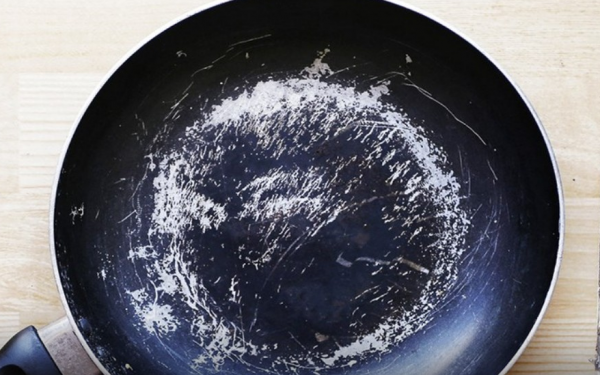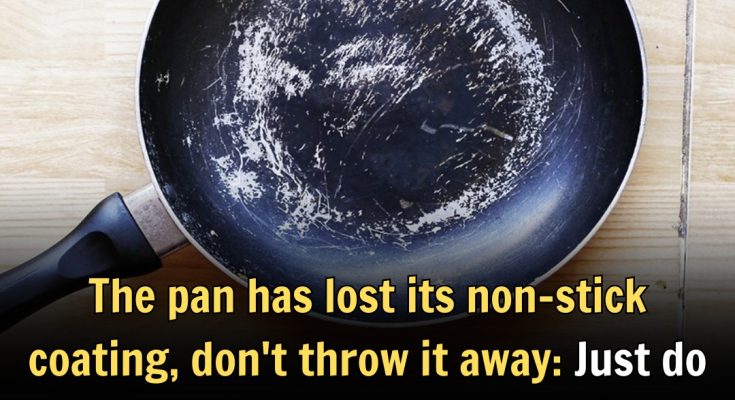Nowadays, frying has become much simpler thanks to the non-stick coating on the pan. But when the pan loses its non-stick coating, everything you fry will stick, making the dish lose its aesthetic and taste less delicious. Apply the simple tip below, ensuring 100% of the dishes will not break even if the non-stick coating is damaged. With this tip, you can take advantage of using the old pan for a while longer.

Small tips for pans that have lost their non-stick coating
Today’s non-stick cooking pots, pans, and pans are all coated with a non-stick coating called Teflon, also known as polytetrafluoroethylene or PTFE. This is a transparent substance that was accidentally invented in 1938 for military use. But by 1951, Teflon was used to coat metal pots and pans, creating a waxy, slippery surface that is easier to clean, bringing great convenience to cooking.
The coating on a non-stick pan, if it meets the quality standards on metal cooking utensils, is not a dangerous problem. Even if this non-stick coating peels off, we eat small pieces of Teflon, it will be excreted through the anus. But if cooking when the pan is too hot, it is another problem. Scientists also recommend not using a non-stick pot or pan for too long, only using it for a maximum of 2-3 years.
If you want to use a non-stick pan or do not want to “spend money” to replace the non-stick pan regularly, you can use this tip, fish and fried foods will absolutely not stick to the pan.
Step 1: Put the non-stick pan on the stove, dry and heat the pan, check by pouring in a spoonful of water, see the water boil and then dry, it is done.
Step 2: Pour cooking oil or fat into the pan, wait for the oil to boil and bubble.
Step 3: Pour eggs or foods such as fish… into the pan and start frying.
Note: Your fish must be dry and free of water. If it gets wet when frying, the fish will splatter with oil.
+ Wash the pan with coffee when you first buy it
For a non-stick pan when you first buy it, you should wash it once with dishwashing liquid to clean the dirt on the surface of the pan, then heat the pan with a moderate amount of coffee and then rinse it with water to clean it.
This method not only helps the pan to be clean but also removes the unpleasant odor of the non-stick coating extremely effectively.
+ Pour oil into the pan before the pan is hot
When using a non-stick pan, you should note that you should pour oil into the pan (which has been wiped dry) first and then place it on the stove. Do not wait for the pan to be hot before adding oil because it will peel off the non-stick coating, causing toxicity to the user and reducing the lifespan and quality of the pan.
In addition, when frying with a non-stick pan, you should use less oil and limit the amount of fat to protect the health of the whole family. You can even fry eggs or toast bread directly on the pan without using oil, fat or butter.
+ Cook at low or medium heat
To use the pan properly and safely, you should note that you should not leave the pan at high temperatures because it will cause the non-stick coating to decompose, causing harm to the user’s health. Therefore, during the cooking process, you should use low or medium heat and lower the temperature if the pan is too hot or smokes. Using at medium and low heat will best ensure that the non-stick coating does not reduce its lifespan.
+ Do not use the pan for baking or braising
Using a non-stick pan to prepare dishes such as baking or braising will cause the non-stick coating of the pan to deteriorate, and this non-stick coating will even quickly be damaged and peel off due to high temperatures. Therefore, you need to pay attention to this issue so as not to affect the quality of the pan and the safety of the dish.
+ Do not use the pan in the oven
According to the manufacturer’s recommendations, non-stick pans are completely unsuitable for high temperatures.
Cooking at high temperatures, especially using the pan in the oven, will cause the non-stick layer of the pan to peel off and seep into the food, endangering the user’s health.
+ Do not season the pan directly with fish sauce and salt
Seasoning directly with the pan is one of the mistakes that many housewives often make. Seasoning fish sauce and salt directly when the pan is hot will cause the non-stick layer to quickly become pitted, reducing the non-stick ability and lifespan of the pan.
In particular, you should also note that you should not use the pan to hold or store food, as the surface of the pan being in contact with food for a long time can also cause the non-stick layer to peel off more quickly.
+ Do not rub metal on the bottom of the pan. Do not use abrasive materials such as knives, forks, tongs, or metal spoons to stir food. You should cook with wooden or bamboo chopsticks and wash with a sponge or soft cloth to protect the non-stick coating from peeling off, while ensuring the quality and safety of the dish.
+ Do not heat the pan



